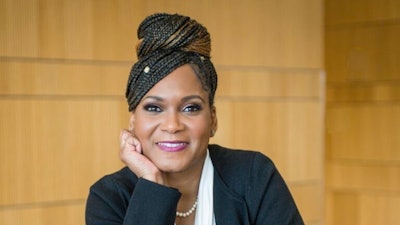While players in the NCAA Tournament were diverse, head coaches and administrators lagged far behind.
That's the conclusions from the new report, “Racial and Gender Equity for Black Women Student-Athletes,” authored by Dr. Shaun R. Harper, founder and executive director of the University of Southern California Race and Equity Center. Harper depicts each team in the Sweet 16 of the NCAA Division I Women’s Basketball Tournament. The head coach is also shown, and demographic data on the university is provided.
Data across Division I is also provided. By example, Black women comprise 21% of the head coaches in NCAA Division I women’s basketball but were outnumbered by white male coaches by 5 percentage points. Despite the presence of Black players in the tournament — the majority on most teams — Black women comprise just 3.8% of undergraduates at the 68 participating institutions. Additionally, some are located in states where governors or legislators have banned or severely restricted diversity, equity, and inclusion (DEI) initiatives.
Division I women’s basketball has extensive student-athlete diversity, but Harper noted the attitude appears to be that it is fine for Black student-athletes to generate extensive revenue in attendance, sponsorship, and alumni support, but representation and supports for these student-athletes is notably absent.
“It’s not fine. It’s absurd. It’s also harmful to Black people, higher education, and our democracy,” Harper wrote. He added that the players deserve more Black faculty, more culturally responsive classrooms, and more Black head coaches and athletic administrators. Dr. Joy Gaston Gayles
Dr. Joy Gaston Gayles
Dr. Joy Gaston Gayles of North Carolina State University (NC State), which has women’s and men’s teams headed to their respective Final Fours, researches intercollegiate athletics. She said the information is well known, but Harper's report is much needed in the face of the growing anti-DEI legislation.
“You can’t value diversity, equity, and inclusion when it benefits you, when it lines your pockets, when it is of interest to folks who have a lot of power, privilege, and money, and then condemn it,” says Gayles. “He makes it plain what is already happening in a way that you just can’t ignore it.”
When Dr. Alpha Alexander, co-founder of the Black Women in Sport Foundation, wrote her master’s thesis in the late 1970s, she analyzed the diversity of student-athletes and administrators. While it has improved somewhat, more than 40 years later, the change has not been dramatic. In the report, Harper noted that only 3.7% of athletic directors in Division I are Black women, and nearly half of those women are at an historically Black college or university (HBCU). He further noted that athletic directors can make a point of hiring qualified Black women to fill senior positions.
“Those people with a seat at the table can make an impact financially and can make changes in hires,” said Alexander.
Harper also compared the number of Black undergraduate women enrolled at each of the 16 universities in 2013 and 10 years later.
Looking at one of the teams heading to the Final Four, University of Connecticut, which is seeking a 12th NCAA Championship, nine of the team’s 14 players are women of color. The head coach is a white male who has been in the position since 1985. Seven percent of the overall student body is Black. The number of Black women enrolled in the university has increased over the past 10 years. The Graduation Success Rate (GSR) is 1% higher for Black female student-athletes than for the overall population of Black female students. However, the percentage of Black female faculty is very low.
Gayles agrees with Harper's recommendation to ask Black women student-athletes what they need and that colorblind approaches to counseling can be detrimental. These young women, she said, may be experiencing micro-aggressions, gaslighting, and unintentional comments that are discriminatory. At times, there is public aggression, such as a journalist recently referring to the Louisiana State University team as “dirty debutantes.” These can all lead to a mental health crisis. The University of Connecticut sought a 12th NCAA Championship.
The University of Connecticut sought a 12th NCAA Championship.
“It could affect their performance on a test, it could affect their performance in a game. People shouldn’t have to go through these mental gymnastics,” Gayles said. “DEI efforts are designed to stop that kind of behavior. … These are young adults. They’re still forming their identities.”
When it comes to meeting the needs of Black women student-athletes in institutions unable to offer comprehensive DEI programming, Alexander said that athletic programs should tap into the Black community.
“African American kids in institutions need to have a safe space,” Alexander said. “You can rebrand it and take it forward in terms of those directions. Also, if you can do linkage with outside organizations, let’s say, the NAACP or organizations like that, including Black churches. The students would have support and be able to see people like themselves in leadership positions. … Young Black women need someone to look up to and hope they can be like.”
Gayles noted that “it’s going to take solidarity and collective action” to combat anti-DEI efforts and truly serve these student-athletes. The student-athletes must also realize their power and use it, such as refusing to play at universities in states with anti-DEI laws.
“Just like how the WNBA players were able after [the death of] George Floyd to lift up the whole awareness, in sports, we have the capability of doing that,” said Alexander.





















